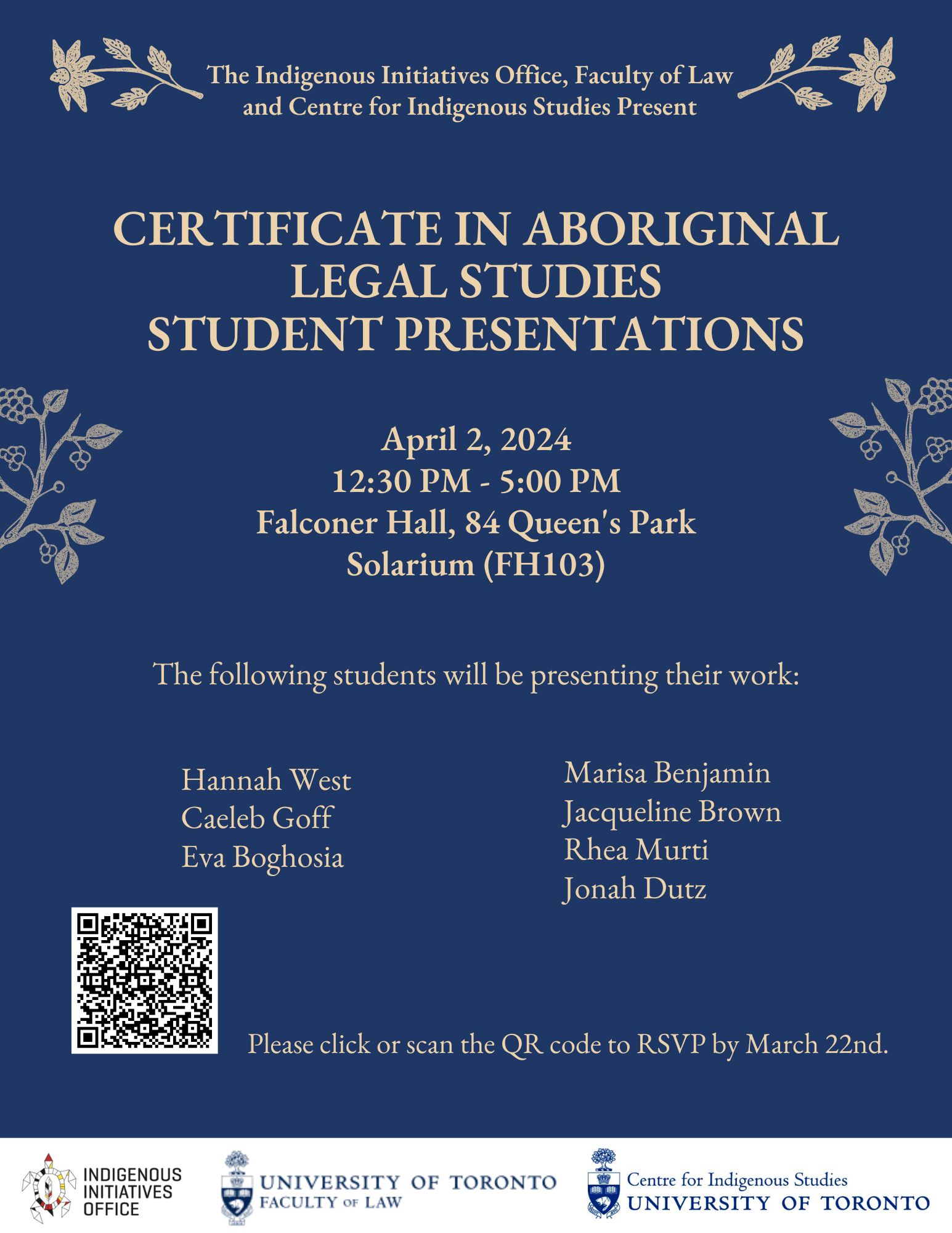
Tuesday April 2nd, 12:30PM-5PM
Faculty of Law, Falconer Hall, 84 Queens Park, Solarium (FH103)
The Indigenous Initiatives Office (Faculty of Law), and Centre for Indigenous Studies (Arts and Science) invite you to the Certificate in Aboriginal Legal Studies student presentations. For catering purposes, please register by March 22, 2024. Lunch will be served between 12:30-1pm. Staff, faculty, students, friends and family are welcome to attend any of the presentations.
Register here: Certificate in Aboriginal Legal Studies Student Presentations (google.com)
1:15-1:45PM Presenter: Hannah West
Title: Salmon, Treaty Rights, and Cumulative Effects: how Yahey v British Columbia could Ground a Novel Legal Argument for the Protection of Salmon
Description: In Yahey v British Columbia, the British Columbia Supreme Court found that the BC government must consider the cumulative effects of all projects within and adjacent to the treaty territory that affect a treaty right when approving a new project that effects the same right. In this paper, I use the Tla’amin First Nation as a case study to show how this argument could be used by First Nations to not only protect wild and farmed salmon but also bolster the Nation’s treaty rights and challenge the animal industrial complex.
1:45-2:15PM Presenter: Caeleb Goff
Title: What Happened to the ‘Voice’?: How Media, Populism, and Behavioural Economics create new barriers for Indigenous Rights work
Description: In October 2023, Australia voted ‘no’ on the Voice to Parliament Referendum. The ‘Voice’ branching from the Uluru Statement from the Heart, would have created a legislated body of Aboriginal and Torres Strait Islander representatives that would allow representatives to speak on issues, laws, and legislation that impact them. The question remains, why did Australia vote no? This project delves into the formation of negative public opinion regarding Indigenous rights by applying theories within behavioural economics and sociology, with the Voice referendum serving as a case study. The work explores how theories of human behaviour elucidate the appeal of populist and nationalist ideologies, and how these shaped the vote on the Voice Referendum. Essentially, this work looks to what could be done differently – and how to operate in a world defined by media and populism.
2:15-2:45PM Presenter: Eva Boghosian
Title: The Implications of the Bill C-92 Reference Decision for Indigenous Natural Resource Governance
Description: My paper and presentation for the Aboriginal Legal Studies Certificate will focus on the implications of the Reference re An Act respecting First Nations, Inuit and Métis children, youth and families (Bill C-92) decision for Indigenous natural resource governance. In particular I focus on what the Bill C-92 decision means in the context of the Reference re Impact Assessment Act decision and how Impact Assessment Legislation may delegate responsibility to and foster greater inclusion of Indigenous peoples moving forward.
2:45-3:15PM Presenter: Marisa Benjamin
Title: Indigenous Data Sovereignty: A Call to Action for Canada
Description: Indigenous data sovereignty has been envisioned as ensuring that Indigenous people will always decide how their data, and data about their culture, is collected, stored, disclosed, and used. Existing Canadian laws impose Crown sovereignty over Indigenous data – a form of “digital colonialism”. Indigenous scholarship and international case studies present alternative pathways for Canada to uphold Indigenous data sovereignty rights. This is a call to action for Canada to change the legal infrastructure regarding data and privacy rights in ways that promote and protect Indigenous data sovereignty.
3:30-4:00PM Presenter: Jacqueline Brown
Title: Compensation for a Thing Which is Irrecoverable: Hybrid Forms of Justice for Murder Among Indigenous Peoples and the French, 1600–1750
Description: When the Huron and the French in North America formed an alliance in the early 1600s, it meant that any murders between their communities did not constitute the murders of enemies, but of friends, and had to be dealt with as such. However, French and Indigenous criminal justice norms differed significantly from one another, and over the next century, the two groups negotiated complex hybrid approaches to address intercommunal murder. Taking these hybrid forms as a starting point, this presentation examines why the French were so resistant to the Indigenous restitution-based approach and argues that it was in large part because they associated it with an appearance of weakness.
4:00-4:30PM Presenter: Rhea Murti
Title: History Repeating Itself at Trans Mountain: The Continued Wrongful Convictions of Indigenous Land Defenders in Canada
Description: I am researching the recent criminal convictions of Indigenous land defenders at the Trans Mountain pipeline blockades, and specifically, looking at these convictions in the context of historical cases of First Nation and Métis chiefs/leaders being wrongfully convicted and executed for opposing settler control in the 1800s. Through this analysis, I will explore whether the criminalization of land defence in Canada can be defined as a miscarriage of justice, and what we can learn from history about the inherent tension between Indigenous land rights and the criminal court system.
4:30-5:00PM Presenter: Jonah Dutz
Title: Reducing False Guilty Pleas Through Indigenous-Led Restorative Justice Programs
Description: Indigenous people have a long history of overrepresentation in the Canadian criminal justice system, including among the wrongfully convicted. Many of these wrongful convictions stem from false guilty pleas. This presentation explores whether Indigenous-led restorative justice programs could help mitigate the risk of false guilty pleas.
A bout the Certificate: The Faculty of Law’s Certificate in Aboriginal Legal Studies is for students who have a vocational or intellectual interest in the intersection between law and the history, politics, thought, or practices of Aboriginal Law. The program complements students’ legal training by providing an interdisciplinary framework within which concepts and methods from the study of law can be applied to a relevant topic in Indigenous Studies. Students complete the Certificate in accordance with Law Faculty requirements and in conjunction with the Centre for Indigenous Studies through the Arts and Science division at the University of Toronto.
https://www.law.utoronto.ca/academic-programs/jd-program/combined-programs/jdcertificate-in-aboriginal-legal-studies

